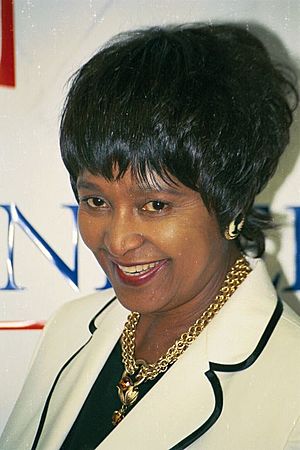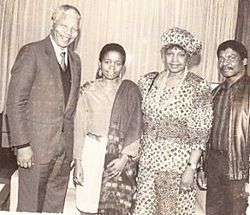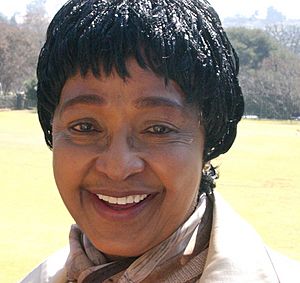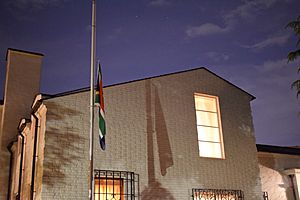Winnie Madikizela-Mandela facts for kids
Quick facts for kids
Winnie Madikizela-Mandela
OLS MP
|
|
|---|---|

Mandela in 1996
|
|
| Member of the National Assembly of South Africa | |
| In office 9 April 2009 – 2 April 2018 |
|
| In office April 1994 – 2003 |
|
| Constituency | Eastern Cape |
| Deputy Minister of Arts, Culture, Science and Technology | |
| In office 11 May 1994 – 31 August 1996 |
|
| President | Nelson Mandela |
| Minister | Ben Ngubane |
| Preceded by | Position established |
| Succeeded by |
|
| 2nd President of the African National Congress Women's League | |
| In office 1993–2003 |
|
| Preceded by | Gertrude Shope |
| Succeeded by | Nosiviwe Mapisa-Nqakula |
| Personal details | |
| Born |
Nomzamo Bob Zanyiwe Madikizela
26 September 1936 Mbizana, Cape Province, Union of South Africa |
| Died | 2 April 2018 (aged 81) Johannesburg, Gauteng, South Africa |
| Resting place | Fourways Memorial Park Cemetery |
| Political party | African National Congress |
| Spouse | |
| Children | |
| Residences |
|
| Alma mater |
|
| Occupation |
|
Winnie Madikizela-Mandela OLS MP (born Nomzamo Winifred Zanyiwe Madikizela; 26 September 1936 – 2 April 2018), also known as Winnie Mandela, was a South African anti-apartheid activist and politician, and the second wife of Nelson Mandela. She served as a Member of Parliament from 1994 to 2003, and from 2009 until her death, and was a deputy minister of arts and culture from 1994 to 1996. A member of the African National Congress (ANC) political party, she served on the ANC's National Executive Committee and headed its Women's League. Madikizela-Mandela was known to her supporters as the "Mother of the Nation".
Born to a Xhosa royal family in Bizana, and a qualified social worker, she married anti-apartheid activist Nelson Mandela in Johannesburg in 1958; they remained married for 38 years and had two children together. In 1963, after Mandela was imprisoned following the Rivonia Trial, she became his public face during the 27 years he spent in jail. During that period, she rose to prominence within the domestic anti-apartheid movement. Madikizela-Mandela was detained by apartheid state security services on various occasions, tortured, subjected to banning orders, and banished to a rural town, and she spent several months in solitary confinement.
In the mid-1980s Madikizela-Mandela exerted a "reign of terror", and was at the centre of violence in Soweto, which led to condemnation by the anti-apartheid movement in South Africa, and a rebuke by the ANC in exile. During this period, her home was burned down by residents of Soweto. The Truth and Reconciliation Commission (TRC) established by Nelson Mandela's government to investigate human rights abuses found Madikizela-Mandela to have been "politically and morally accountable for the gross violations of human rights committed by the Mandela United Football Club", her security detail. Madikizela-Mandela endorsed the killing of alleged police informers and apartheid government collaborators, and her security detail carried out kidnapping and murder.
Nelson Mandela was released from prison on 11 February 1990, and the couple separated in 1992; their divorce was finalised in March 1996. She visited him during his final illness. As a senior ANC figure, she took part in the post-apartheid ANC government, although she was dismissed from her post amid allegations of corruption. In 2003, Madikizela-Mandela was convicted of theft and fraud, and she temporarily withdrew from active politics before returning several years later.
Contents
Early life and education
Madikizela-Mandela's Xhosa name was Nomzamo. She was born in the village of Mbhongweni, Bizana, Pondoland, in what is now the Eastern Cape province. She was the fifth of nine children, seven sisters and a brother. Her parents, Columbus and Gertrude, who had a white father and Xhosa mother, were both teachers. Columbus was a history teacher and a headmaster, and Gertrude was a domestic science teacher. Gertrude died when Winnie was nine years old, resulting in the break-up of her family when the siblings were sent to live with different relatives. Madikizela-Mandela went on to become the head girl at her high school in Bizana.
Upon leaving school, she went to Johannesburg to study social work at the Jan Hofmeyr School of Social Work. She earned a degree in social work in 1956, and decades later earned a bachelor's degree in international relations from the University of the Witwatersrand.
She held a number of jobs in various parts of what was then the Bantustan of Transkei; including with the Transkei government, living at various points of time at Bizana, Shawbury and Johannesburg. Her first job was as a social worker at Baragwanath Hospital in Soweto.
Marriage to Nelson Mandela
Madikizela met lawyer and anti-apartheid activist Nelson Mandela in 1957, when he was still married to Evelyn Mase. She was 22 years old and standing at a bus stop in Soweto when Mandela first saw her and charmed her, securing a lunch date the following week. The couple married in 1958 and had two daughters, Zenani (born 1958) and Zindziswa (born 1960). Mandela was arrested and jailed in 1963, and was not released until 1990.
The couple separated in 1992. They finalised their divorce in March 1996 with an unspecified out-of-court settlement. Her attempt to obtain a settlement up to US $5million (R70 million) – half of what she claimed her ex-husband was worth – was dismissed when she failed to appear in court for a settlement hearing.
When asked in a 1994 interview about the possibility of reconciliation, she said: "I am not fighting to be the country's First Lady. In fact, I am not the sort of person to carry beautiful flowers and be an ornament to everyone."
Madikizela-Mandela was involved in a lawsuit at the time of her death, claiming that she was entitled to Mandela's homestead in Qunu, through customary law, despite her divorce from Nelson Mandela in 1996. Her case was dismissed by the Mthatha High Court in 2016, and she was reportedly preparing to appeal to the Constitutional Court at the time of her death, after failing at the Supreme Court of Appeal in January 2018.
Apartheid: 1963–1985
Winnie Mandela emerged as a leading opponent of apartheid during the latter part of her husband's imprisonment. Due to her political activities, she was regularly detained by the National Party government. She was subjected to house arrest, kept under surveillance, imprisoned, and banished to the remote town of Brandfort.
Her longest jailing was for 491 days (as noted in her account 491 Days: Prisoner Number 1323/69), beginning on 12 May 1969, at Pretoria Central Prison, where she spent months in solitary confinement. By her own account, her experience in prison "hardened" her.
From 1977 to 1985, she was banished to the town of Brandfort in the Orange Free State and confined to the area,. It was at this time that she became well known in the Western world. She organised a creche with a non-governmental organization, Operation Hunger and a clinic in Brandfort with Dr Abu Baker Asvat, her personal physician, campaigned actively for equal rights and was promoted by the ANC as a symbol of their struggle against apartheid. While in exile in Brandfort, she, and those who attempted to assist her, were harassed by the apartheid police.
Transition to democracy: 1990–2003
During South Africa's transition to multi-racial democracy, she adopted a far less conciliatory attitude to White South Africans and was considered to be as controversial as her husband was before his arrest. She was seen on her husband's arm when he was released in February 1990, the first time the couple had been seen in public for nearly 30 years.
However, their 38-year marriage ended in April 1992, and the divorce was finalised in March 1996. She then adopted the surname "Madikizela-Mandela". Also in 1992, she lost her position as the head of the ANC social welfare department, amid allegations of corruption.
Madikizela-Mandela actively campaigned for the ANC in South Africa's first non-racial elections. Appointed Deputy Minister of Arts, Culture, Science and Technology in May 1994, she was dismissed 11 months later following allegations of corruption.
In 1995, multiple prominent members of the ANC Women's League, including Adelaide Tambo resigned from the National Executive Committee of that body because of disagreement with Madikizela-Mandela's leadership of the body, and amid a controversy about a large donation from Pakistani politician Benazir Bhutto that was not handed over to the League by Madikizela-Mandela.
She remained extremely popular amongst many ANC supporters. In December 1993 and April 1997, she was elected president of the ANC Women's League, although she withdrew her candidacy for ANC Deputy President at the movement's Mafikeng conference in December 1997. Earlier in 1997, she appeared before the Truth and Reconciliation Commission. Archbishop Desmond Tutu as chairman of the commission recognised her importance in the anti-apartheid struggle, but exhorted her to apologise and to admit her mistakes. In a guarded response, she admitted "things went horribly wrong".
During the 1990s, she associated with Israeli organised crime figures operating in South Africa, who were involved in extorting the local Jewish community, and other criminal activity.
In 2002, Madikizela-Mandela was found guilty by a Parliamentary ethics committee of failing to disclose donations and financial interests. Madikizela Mandela was often absent from Parliament, sometimes for months at a time, and was ordered by Parliament to account for her absences in 2003.
Legal problems and withdrawal from South African politics: 2003–2007
In 2003, Madikizela-Mandela offered to act as a human shield prior to the 2003 invasion of Iraq. Also in 2003, she helped defuse a hostage situation at Wits University, where a student who was in arrears with fees took a staff member hostage at knifepoint.
Fraud and theft case
On 24 April 2003, Madikizela-Mandela was convicted on 43 counts of fraud and 25 of theft, and her broker, Addy Moolman, was convicted on 58 counts of fraud and 25 of theft. Both had pleaded not guilty. The charges related to money taken from loan applicants' accounts for a funeral fund, but from which the applicants did not benefit. Madikizela-Mandela was sentenced to five years in prison. Shortly after the conviction, she resigned from all leadership positions in the ANC, including her parliamentary seat and the presidency of the ANC Women's League.
In July 2004, an appeal judge of the Pretoria High Court ruled that "the crimes were not committed for personal gain". The judge overturned the conviction for theft, but upheld the one for fraud, handing her a three years and six months suspended sentence.
Return to politics
When the ANC announced the election of its National Executive Committee on 21 December 2007, Madikizela-Mandela placed first with 2,845 votes.
Madikizela-Mandela criticised the anti-immigrant violence in May–June 2008 that began in Johannesburg and spread throughout the country, and blamed the government's lack of suitable housing provisions for the sentiments behind the riots. She apologised to the victims of the riots and visited the Alexandra township. She offered her home as shelter for an immigrant family from the Democratic Republic of the Congo. She warned that the perpetrators of the violence could strike at the Gauteng train system.
Madikizela-Mandela secured fifth place on the ANC's electoral list for the 2009 general election, behind party president Jacob Zuma, President of South Africa Kgalema Motlanthe, Deputy President Baleka Mbete, and Finance Minister Trevor Manuel. An article in The Observer suggested her position near the top of the list indicated that the party's leadership saw her as a valuable asset in the election with regard to solidifying support among the party's grassroots and the poor.
Madkizela-Mandela was largely sidelined by the ANC in the post-apartheid period. Despite her status as an ANC MP over much of that period, she largely associated with non-ANC figures including Bantu Holomisa and Julius Malema. Madikizela-Mandela was a political patron of Malema, who was expelled from the ANC and later formed his own party, the Economic Freedom Fighters.
2010 interview with Nadira Naipaul
In 2010, Madikizela-Mandela was interviewed by Nadira Naipaul. In the interview, she attacked her ex-husband, claiming that he had "let blacks down", that he was only "wheeled out to collect money", and that he is "nothing more than a foundation". She further attacked his decision to accept the Nobel Peace Prize with F. W. de Klerk. Among other things, she reportedly claimed Mandela was no longer "accessible" to her daughters.
The interview attracted media attention, and the ANC announced that it would ask her to explain her comments regarding Nelson Mandela. On 14 March 2010, a statement was issued on Madikizela-Mandela's behalf claiming that the interview was a fabrication.
Death and funeral
Winnie Madikizela-Mandela died at the Netcare Milpark Hospital in Johannesburg on 2 April 2018 at the age of 81. She suffered from diabetes and had recently undergone several major surgeries. She "had been in and out of hospital since the start of the year".
Madikizela-Mandela was granted a "Special Official Funeral" by the South African government. Her public funeral service was held at Orlando Stadium on 14 April 2018. Planning for Madikizela Mandela's funeral was largely handled by her daughters and Julius Malema, and the ANC reportedly had to "fight for space" on the programme. At the public service, ANC and South African President Cyril Ramaphosa "acknowledged" that the ANC failed to stand by Madikizela-Mandela's side during her legal troubles. Julius Malema delivered an impassioned speech in which he criticised the United Democratic Front for distancing themselves from Madikizela-Mandela in the 1980s. Malema also criticised members of the National Executive Committee of the ANC Women's League for resigning in 1995, because they regarded Madikizela-Mandela as a "criminal". Madikizela-Mandela's daughter Zenani attacked those who "vilified" her mother, calling them hypocrites. After the public service, her body was interred at a cemetery in Fourways in the north of Johannesburg during a private memorial service.
A number of ANC figures prepared to defend themselves against the allegations made at the funeral; however, the ANC urged "restraint".
Honours and awards
In 1985, Mandela won the Robert F. Kennedy Human Rights Award along with fellow activists Allan Boesak and Beyers Naudé for their human rights work in South Africa. She received a Candace Award for Distinguished Service from the National Coalition of 100 Black Women in 1988.
In January 2018, the University Council and University Senate of Makerere University, Kampala, Uganda, approved the award of an honorary Doctor of Laws (LLD) degree to Winnie Nomzamo Madikizela-Mandela, in recognition of her fight against apartheid in South Africa.
In 2021, the Mbizana Local Municipality in the Eastern Cape was officially renamed the Winnie Madikizela-Mandela Local Municipality. The town of Brandfort in the Free State was also officially renamed as Winnie Mandela.
In 2022, the section of the R562 Road connecting Midrand with Olifantsfontein, was renamed from Olifantsfontein Road to Winnie Madikizela-Mandela Road by the City of Ekurhuleni in Gauteng.
See also
 In Spanish: Winnie Mandela para niños
In Spanish: Winnie Mandela para niños
- List of civil rights leaders
- List of people subject to banning orders under apartheid
- The Resurrection of Winnie Mandela, 2018 biography of Mandela by Sisonke Msimang




